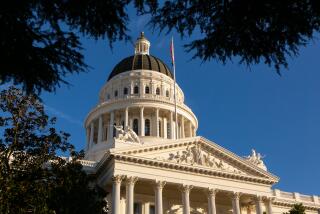Edwards Wants Better Health Care for Minorities
- Share via
WASHINGTON — Sen. John Edwards, a contender for the Democratic presidential nomination in 2004, on Wednesday proposed creating a national medical translation system and other programs to improve health care and education for Latinos and other minorities.
“If we are to live up to our ideals as Americans, we cannot allow the color of your skin or the country your family came from to determine the quality of your health care. It should be that simple,” the senator from North Carolina told supporters of the Mexican American Legal Defense and Educational Fund at an awards dinner here.
Language and cultural barriers have created significant disparities in health care for Latinos, Edwards said. A recent study found that fewer than half the hospitals surveyed provided interpreters for patients or family members who needed such a service, he said. Compared with whites, he said, Latinos were more likely to suffer from diabetes and to die of cancer and were less likely to undergo heart bypass surgery or organ transplants.
“We need to stop differences in language and culture from interfering with good health care,” he said.
The translation system would establish a 24-hour language hotline for use by smaller hospitals and those in rural areas. Large urban hospitals in the country’s 100 most populous counties would get additional resources to provide on-call translators for five of the most common languages.
In addition, Edwards said, federal funding should be doubled for research into differences in disease rates among minority communities. He called for additional outreach and prevention programs for Latinos, particularly expanding the use of promatoras, or peer educators. And he proposed setting up a unit within the Justice Department’s civil rights division to protect individuals’ health-care rights.
On education, Edwards encouraged communities “to pay more attention to the special needs of Hispanic students -- their concentration in some of our worst schools, the high dropout rates, the language barriers and the need to support parents, brothers and sisters.”
“There are some kids out there ... who are getting left behind -- not because they’re not willing to do the work to go to college, but because they’re afraid they won’t be able to keep up [and] they won’t be able to afford it,” Edwards said. He proposed doubling funds for GEAR UP (Gaining Early Awareness and Readiness for Undergraduate Programs), a federal program that prepares low-income students for college. Edwards also urged Congress to approve legislation that would enable undocumented immigrants to attend state colleges at in-state tuition rates, making education more affordable for them.
Both political parties are actively courting voters among the Latino population, which now numbers about 37 million, according to 2000 Census figures. While Latinos have traditionally supported Democratic candidates, George W. Bush received 38% of the Latino vote in the 2000 presidential election and had strong support from that community as governor of Texas.
Marisa J. Demeo, a regional counsel for MALDEF, said her organization was placing a new emphasis on its work in the southern United States, recently opening an office in Atlanta. In his speech, which was received politely but not excitedly, Edwards cited increases in the Latino population of more than 300% across the South, including in his home state.
MALDEF, Demeo said, was “interested in hearing what his vision was of what he could do at the national level.... This is a relationship we want to develop over the long term, and we want to make sure that he is an advocate for our community.” She stopped short of supporting his candidacy, saying that MALDEF does not endorse candidates.
“I was actually surprised at how direct he was,” said Rep. Xavier Becerra (D-Los Angeles). “I commend him for being so upfront.”
More to Read
Get the L.A. Times Politics newsletter
Deeply reported insights into legislation, politics and policy from Sacramento, Washington and beyond. In your inbox twice per week.
You may occasionally receive promotional content from the Los Angeles Times.










